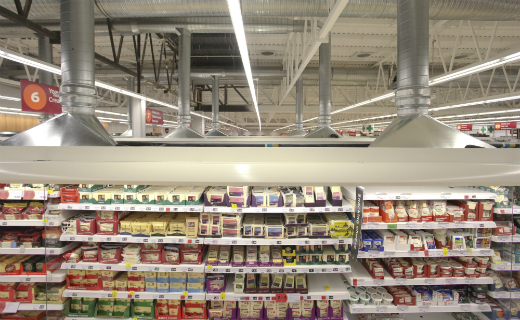LONDON, 2015-1-21 — /EPR Retail News/ — Sainsbury’s has pioneered new technology to power its fridges in its Portishead store with a new natural product – that’s produced entirely from waste.
eCO2 is made from waste sugar beet in the UK by the manufacturers that supply Sainsbury’s supermarkets with sugar.
The new CO2 natural refrigerant from A-Gas – eCO2 – is the first high specification Carbon Dioxide refrigerant to be produced sustainably in the UK and is a product that can make a significant difference in cutting a store’s carbon footprint.
Typically, more than 40 per cent of a supermarket’s energy consumption is directly linked to its refrigeration systems. Natural refrigerants, like CO2, are becoming a popular option as stores look to reduce their carbon footprint.
Following successful trials with Sainsbury’s, A-Gas has now extended this service to the rest of the industry. A-Gas provides customers with a suitably-rated cylinder in which they can supply a liquid sample from the refrigeration system. This is returned to A-Gas where it is tested at its state of the art laboratory.
The growth in the popularity of natural refrigerants will be further enhanced by the uncertainty for future strengthening of the F-Gas legislation in the coming years; which will see the phasing out of HFC refrigerants with a high Global Warming Potential (GWP).
Sainsbury’s is looking to reduce operational Carbon emissions by 30% absolute and 65% relative compared to 2005; and at Portishead the supermarket group believes eCO2 is a refrigerant which can make an important contribution to this.
A-Gas Operations Manager Rob Parker said: “The X Factor for eCO2 is the sustainable way it’s produced.
“Most CO2 refrigerants are recovered from dirty industrial processes which are far from green in their methods. eCO2 is a by-product of bioethanol production from waste sugar beet – using crops not destined for sugar production.
“This is a first for A-Gas and the UK market, as a CO2 refrigerant produced from waste sugar beet has never been on sale before on a commercial basis.”
Sainsbury’s Head of Refrigeration John Skelton said: “We wanted to use eCO2 to reduce our carbon footprint. A supermarket refrigeration system operates 24-hours a day, 365 days a year, so it has to be extremely reliable. Having the right refrigerant plays an important part in this.”
Little Story: Postive Waste
Put all waste to positive use.
###
